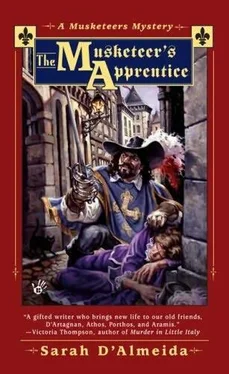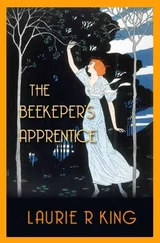Sarah D'Almeida - The Musketeer's Apprentice
Здесь есть возможность читать онлайн «Sarah D'Almeida - The Musketeer's Apprentice» весь текст электронной книги совершенно бесплатно (целиком полную версию без сокращений). В некоторых случаях можно слушать аудио, скачать через торрент в формате fb2 и присутствует краткое содержание. Жанр: Триллер, на английском языке. Описание произведения, (предисловие) а так же отзывы посетителей доступны на портале библиотеки ЛибКат.
- Название:The Musketeer's Apprentice
- Автор:
- Жанр:
- Год:неизвестен
- ISBN:нет данных
- Рейтинг книги:4 / 5. Голосов: 1
-
Избранное:Добавить в избранное
- Отзывы:
-
Ваша оценка:
- 80
- 1
- 2
- 3
- 4
- 5
The Musketeer's Apprentice: краткое содержание, описание и аннотация
Предлагаем к чтению аннотацию, описание, краткое содержание или предисловие (зависит от того, что написал сам автор книги «The Musketeer's Apprentice»). Если вы не нашли необходимую информацию о книге — напишите в комментариях, мы постараемся отыскать её.
In a search for his apprentice's killer, Musketeer Porthos rallies his friends to discover who was responsible, pursuing the truth even as he puts his own life in danger.
The Musketeer's Apprentice — читать онлайн бесплатно полную книгу (весь текст) целиком
Ниже представлен текст книги, разбитый по страницам. Система сохранения места последней прочитанной страницы, позволяет с удобством читать онлайн бесплатно книгу «The Musketeer's Apprentice», без необходимости каждый раз заново искать на чём Вы остановились. Поставьте закладку, и сможете в любой момент перейти на страницу, на которой закончили чтение.
Интервал:
Закладка:
A knot grew in his throat. He would have given a great deal to be back there. He was not normally given to fantastic dreaming nor to weaving fantasies of what could never be, but this, this he wished he could manage-to wind back time, like a string on a spool, to that point at which his father had convinced him to leave St. Guillaume and go to Paris. The point at which his father had promised, and promised faithfully at that, to make sure that Amelie found herself a husband and was happily bestowed.
Had his father failed on his promise? Had he lied all along? Or had Amelie braved it all for the love of Porthos?
Porthos could not know. He’d written a letter to Rouge and Morgaine when he’d changed his name and gone into the musketeers, but he’d not given them his address, and they’d never tried to find him. Thinking back, he believed he’d been afraid if they wrote back or visited him, they’d tell him that Amelie was happy and the mother of a brood. Why that had scared him then, he didn’t know. He’d now give half his life to know just that.
It was with a knot at his throat, a prickly feeling in his eyes that he got within sight of the mill house. And stopped. When he’d left, his friend’s house had been a small, low building-one large room, where the whole family-six children, five dogs, and the parents-all slept and cooked and lived. Above it on a hill kept clear cut and so situated that it enjoyed almost continuous breezes from the sea, stood the windmill proper-a wooden building equipped with blades as large as sails, beating continuously against the sky and propelling the stone grinders inside to produce flour. The miller had bought the wheat from everyone around here and ground it and sold it at market to people in other places-as well as renting the use of his mill to grind the flour the farmers themselves used.
It had been one mill, small and perhaps mean, befitting the surrounding countryside and the small horizons of St. Guillaume. Now, on the hill above there were five mills. Five of them, arrayed, their blades beating at the sky. And beneath the hill, sheltered, was a sprawling building, probably as large as the manor house, though built of brick instead of stone, and in far better repair.
Porthos felt, all of a sudden, a misgiving. This could not be Rouge’s home. It had all changed. Something must have happened. Rouge and his family had died, perhaps, leaving some stranger to buy the home and to exploit the mills and the region, who knew to what purpose.
He tried to look as self-assured as ever as he walked up to the house. He would be turned out again, and now his friends would have nowhere to sleep. It truly was dealing badly with Athos to force him to sleep under a tree.
Not that Porthos thought, for a moment that Athos was too old for it. In his midthirties, Athos was fond of telling them how much older he was and how his body was decaying, but, faith, Porthos saw no evidence of it. In fact, he had seen Athos go from duel to guard duty to brawl, fighting as well as men ten years his junior and making himself a formidable opponent to all who crossed swords with him.
No. It wasn’t Athos’s age that made Porthos flinch from the idea of making his friend sleep under a tree. It was Athos’s nobility and the way he had of looking around at a house others would consider well appointed-even Porthos’s own manor house-with a faint look of distaste, as though someone had suggested he lie down with swines.
With this in mind, Porthos walked his horse up to the door, and knocked. The door was new, smooth and painted a dark red. The brick walls were whitewashed. From inside the house came the smell of wood smoking and the scent of cooking which made Porthos’s stomach growl.
He knocked on the door again, almost timidly. Of course, he was aware that with his size even a timid knock sounded like the clapping of doomsday. From within came the sound of broken crockery and a peevish female exclamation. And then steps to the door.
Porthos steeled himself so that he was not at all surprised when a total unknown opened the door. She was a young woman, in an immaculate cap, shabby but well-laundered clothes, and an spotless apron over it all. She looked at Porthos with the stare of complete nonrecognition. “Yes?” she said.
“I beg your pardon,” Porthos said. He removed his hat, since he was talking to an unknown female. “Only, I used to be a good friend of the owner of this place, a certain Rouge and his wife, Morgaine? I guess they must have sold and I’ll disturb you no-”
But at this moment the young woman’s eyes went wide and shocked. She looked at him and dropped a hasty and awkward curtsey. “Monsieur Pierre du Vallon!” she said. “I beg your pardon, Monsieur, only I was just a child when you left, and I didn’t immediately recognize you with your uniform. Well, my master keeps us entertained morning to night with stories of your adventures when you were young men.” She smiled broadly, and stepped away from the door. “Come in, come in.”
Porthos handed the reins of his horse, blindly, to Athos, and stepped through the door, into warmth and light.
It took Porthos only a moment to realize it was the same room that had been a whole house in his childhood. Only now the broad hearth had been redone with all, what seemed to be, brand-new brick work, and the walls were newly whitewashed. Against the walls, where there had been various contrivances of cots and tables to provide for the necessities of the family, there were trunks, some of them painted-and Porthos would have bet, in his day, that the family didn’t have enough provisions for all those trunks. Some of the trunks were draped in cloth and outfitted with cushions, ready for use as seating, but there was also a broad scrubbed table, and several long benches in the center of the room.
Doors led out of that central room, in several directions, and the young woman scurried through one of them. The other three men crowded at the door, but did not come in. From somewhere in the now cavernous entrails of the house, came a masculine voice calling out, and a female one answering, and then the sound of running.
Before Porthos could quite take stock of anything, a woman came running out of one of the doors. A small, slim woman with dark hair ineffectively encased in a white cap and swirling skirts of what appeared to be a rich gown. Porthos could see no other details because she was running full tilt towards him, and, halfway through, jumped towards him, launching herself into his arms. “ Pierre,” she said. “ Pierre you fool.”
She smelled of fresh bread and herbs, and as she hugged him fiercely, he realized she was his childhood playmate, lately Rouge’s wife, Morgaine. He remembered when they were all small how all the old people in the village used to talk about how her parents had given her such an unchristian name and what it must mean for the poor waif growing up.
But now, looking at her, as she stepped away from him, her dark eyes twinkling with amusement, he realized that Morgaine was the most appropriate name, as there seemed to be something enchanting and otherworldly about her, and indeed, it was easier for him to believe in the transformation of Rouge’s abode through the simple means of magic than through any earthly agency.
“Morgaine,” he said.
And on that, Rouge came running into the room. He was built on the same scale as Porthos, and had the same red hair but in a more startling red, from whence his name came. When Porthos had gotten older and thought about it, he’d realized there was a high prevalence of redheads in the village, and it hadn’t taken him very long at all to imagine that all his ancestors must have been very close to their serfs and servants and farmers.
He was wearing a doublet and hose in dark brown velvet and no one-no one would have thought that he was anything but at the very least minor nobility. Of course, Porthos was used to this, to the bourgeoisie and businessmen of Paris putting on airs that dwarfed the nobility. What he wasn’t used to was seeing it in his native village and amid his own friends.
Читать дальшеИнтервал:
Закладка:
Похожие книги на «The Musketeer's Apprentice»
Представляем Вашему вниманию похожие книги на «The Musketeer's Apprentice» списком для выбора. Мы отобрали схожую по названию и смыслу литературу в надежде предоставить читателям больше вариантов отыскать новые, интересные, ещё непрочитанные произведения.
Обсуждение, отзывы о книге «The Musketeer's Apprentice» и просто собственные мнения читателей. Оставьте ваши комментарии, напишите, что Вы думаете о произведении, его смысле или главных героях. Укажите что конкретно понравилось, а что нет, и почему Вы так считаете.










